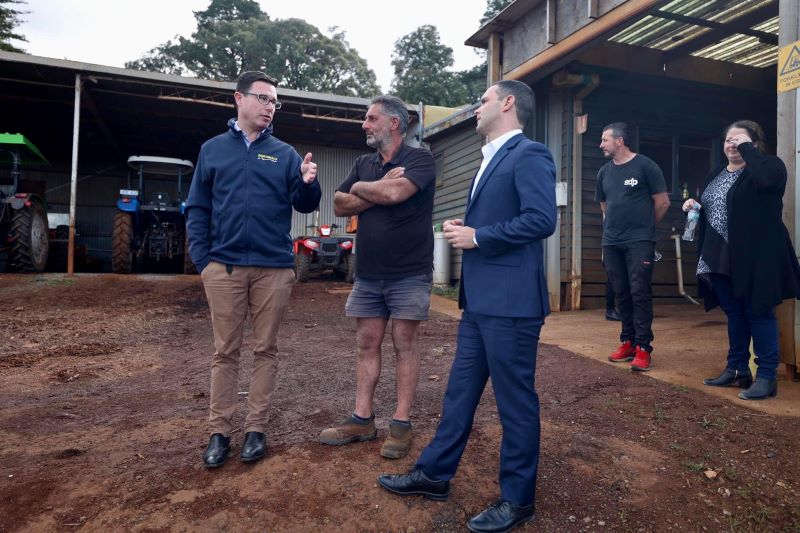The survey, released today, found farm sector sentiment in the state had declined in the latest quarter, after rallying at the end of 2022.
Rabobank regional manager for southern NSW Sally Bull said farmers’ concerns about softening commodity prices, higher interest rates and dry conditions in some parts of the state were eroding the positivity generated by recent good agribusiness conditions – after three years of enjoying high rainfall and strong commodity prices.
The survey, completed last month, shows a drop in the number of NSW farmers expecting an improvement in agribusiness conditions in the coming 12 months – at just 12 per cent (down from 20 per cent in the previous survey), while those with a pessimistic outlook had increased slightly to 34 per cent (from 30 per cent). Fifty per cent of NSW farmers surveyed believed agricultural business conditions would remain stable.
For those farmers with a pessimistic outlook, falling commodity prices were a principal concern, cited by 68 per cent (up from 17 per cent last quarter).
Concerns about rising interest rates have also risen – cited by 20 per cent of those with a negative outlook, up from nine per cent last quarter.
The prospect of a return to dry seasonal conditions was also weighing on the minds of farmers, with 19 per cent citing this as a reason they expect agribusiness conditions to decline in the year ahead.
High farm input prices and excessive rainfall were becoming less of a worry however, with some input costs easing in recent months and the third consecutive La Niña weather pattern coming to an end. Rising input costs were identified as a concern by 29 per cent of NSW farmers with a negative outlook on the year ahead (down from 40 per cent last quarter), while excessive rainfall was a worry for just six per cent (dropped from 43 per cent).
Ms Bull said, after experiencing the “rare combination” of back-to-back years of strong commodity prices and generally good seasonal conditions across the state, it was not surprising overall farmer optimism was declining as operating conditions returned to more average settings.
“The third consecutive La Niña weather system delivered extraordinary rainfall in many parts of the state through spring and early summer in 2022. However, in recent months, dry conditions have been experienced in many regions, and this will be weighing on farmers’ minds as they plan for the year ahead,” she said.
“Farmers operating in the grain, beef, sheep, dairy and sugar sectors are all anticipating an easing in agribusiness conditions in the next 12 months.”
The survey found the largest decline in confidence to be observed within the state’s beef sector – with 38 per cent expecting economic conditions to worsen in the year ahead (up from 23 per cent last quarter) and only 11 per cent expecting an improvement (compared with 27 per cent previously).
Easing commodity prices were identified as a concern by 66 per cent of beef producers who had a negative view on the coming 12 months (up from 12 per cent last quarter).
And in the year ahead, 45 per cent of NSW beef producers are expecting their farm income to decline (compared with 15 per cent last quarter).
Confidence among the state’s grain growers was found to be at similar levels to beef.
This quarter, 36 per cent of NSW grain growers surveyed believe the economic conditions would worsen in the coming 12 months (up from 30 per cent last quarter), while
just 12 per cent are expecting business conditions to improve – down from 19 per cent previously. And 52 per cent of growers are anticipating conditions to remain unchanged.
Ms Bull said the “at times excessive” rainfall received late last year had set many grain growers up well for the coming winter cropping season, with many areas enjoying good soil moisture profiles, but autumn rain will still be required for sowing.
The survey showed good seasonal conditions, positive commodity prices and decreasing input costs were the key drivers for the state’s grain growers with a positive view on the year ahead.
Sheep producer confidence across NSW has declined slightly this survey, with the majority of producers expecting farm business conditions to improve or remain the same.
Concern about easing commodity prices was the major driver of declining confidence in the sheep sector, cited by the majority of producers reporting a pessimistic outlook.
This is despite new trade agreements and post Covid recovery in Chinese consumer markets providing possible upsides for sheepmeat markets, Ms Bull said. “And there are positive signs for wool demand, with sales volumes and prices seeing increases throughout February, she said.
Concerns about high input costs and falling commodity prices have seen cotton grower confidence fall this quarter with more than half surveyed now expecting business conditions to decline in the next 12 months.
For the cotton sector, Ms Bull said, plantings in southern NSW are down on previous years due to the very wet and cool conditions at the beginning of the season. “In southern NSW, we are expecting the area of cotton planted to be approximately 55,000 hectares, which is a reduction from about 70,000 hectares last season,” she said.
Rice plantings in southern NSW have also been impacted by weather conditions, Ms Bull said.
Cotton production is, however, “on-track” in central and northern NSW, after those regions also experienced cooler conditions that led to a slow start to the season.
But warmer conditions throughout February are driving improved crop development, Ms Bull said. “Plantings around the Macquarie Valley came home strong and have overall landed close to normal,” she said.
The latest Rabobank survey found farm business viability levels remained high in the state, with almost all farmers surveyed (98 per cent) reporting viable businesses. And 62 per cent were expecting their gross farm income will increase or remain the same over the next 12 months.
Investment intentions had remained healthy among the state’s farmers, with 90 per cent planning to increase or maintain the current level of investment in their farm business (unchanged from the previous quarter).
Spending on farm infrastructure (fences, yards, silos and sheds) is high on the priority list for farmers – planned by 84 per cent who are intending to invest more in their farm businesses in the year ahead. Purchasing new plant and machinery was identified by just under half of those NSW farmers proposing to lift their investment levels.
Grain growers were reporting an increased appetite for investment.
Ms Bull said there is continued interest in property purchase among farmers overall, with appetite for land increasing slightly in the latest survey and 28 per cent of those looking to increase investment planning to buy property (up from 18 per cent previously).
“However, vendor and buyer expectations have moved further apart in recent months and properties are now taking longer to sell with price reductions evident on some properties to achieve a sale,” she said.
This survey, farmers were specifically asked their views about the one factor that would be critical to the success of their businesses over the next five years.
Improving processes and finding efficiencies was identified by 30 per cent of NSW farmers, while 20 per cent believe managing succession will be most important.
A comprehensive monitor of outlook and sentiment in Australian rural industries, the Rabobank Rural Confidence Survey questions an average of 1000 primary producers across a wide range of commodities and geographical areas throughout Australia on a quarterly basis.
The most robust study of its type in Australia, the Rabobank Rural Confidence Survey has been conducted since 2000 by an independent research organisation. The next results are scheduled for release in June 2023.







